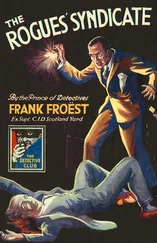'This jelly,' said Rubin, 'couldn't a scientist have developed it instead?'
'Unlikely.' Anawak joined the discussion. 'Dr Johanson's explanation makes more sense. If this were a human project, what would be the point of attacking via the depths? That's a pretty big detour.'
'Because killer algae are found in the sea.'
'Why use killer algae in the first place? Anyone capable of creating a strain of algae more toxic than Pfiesteria would surely be able to find some pathogen that doesn't live in water. Why breed crabs if ants, birds or rats would do the job?'
'Rats can't trigger a tsunami.'
'That jelly was concocted in a lab,' insisted Vanderbilt. 'It's a synthetic substance, which-'
'I don't buy it,' interrupted Anawak. 'Not even the navy would be capable of that, and from what I've heard, it's pretty darned good at messing with animals.'
Vanderbilt's head was shaking so fast that he looked as if he was having a convulsion.
'What are you trying to say?'
'I'm referring to a programme of experiments codenamed MKO.'
'Never heard of it.'
'Well, for years now the navy has been experimenting with dolphins and other marine mammals, trying to manipulate their behaviour by putting electrodes in their-'
'Bullshit.'
'It didn't work, though, or at least not in the way they'd intended, so now they're using Ray Kurzweil's ideas to-'
'Kurzweil?'
'A leading authority on artificial intelligence,' Fenwick explained. Suddenly he had become animated. 'He came up with a vision of the future that pushed back the boundaries of current neural research. If you want to establish how much we know about the workings of the brain … in fact, better still, if you want to understand how much another intelligent species might know about the brain, you should study his work.' Fenwick was flushed with excitement. 'That's it! Kurzweil's neural network computer! You could really be on to something.'
'I'm sorry,' said Vanderbilt, 'but I have no idea what you're talking about.'
'Really?' Li smirked. 'I thought the CIA took a professional interest in brainwashing.'
Vanderbilt snorted. 'Can anyone tell me what he's talking about? Because I'll be darned if I know. Is someone going to explain?'
'The neural network computer is a blueprint for creating a perfect replica of an individual brain,' said Oliviera. 'Our brains are made up of billions of nerve cells, or neurons. Each neuron is connected to countless others. They communicate using electrical pulses, allowing our brains to continually update, reorder and archive what we know, learn and feel. Every single second of our lives, even when we're asleep, our brains are being reconfigured. Modern scanning technology gives us pictures of the brain that are accurate to within one millimetre of detail. We can watch how the brain thinks and feels, and which neurons are activated when, for example, we kiss or experience pain or recall a past event.'
'The scans show which parts of the brain do what, so the navy knows where to place the electrical signals to achieve a particular response.' Anawak had taken over. 'But they aren't detailed enough. If you think of them as maps, you can only see objects in excess of fifty square metres. Kurzweil predicts that we'll soon have the ability to scan an entire brain, mapping every single synaptic connection and every neurotransmitter, and detailing the concentration of every chemical. We'll have a complete model of every cell.'
'Gee,' said Vanderbilt.
'And once you've gathered all that information,' said Oliviera, 'you'll be able to install the entire brain and all its functions in a computer, which would replicate that particular person's thought processes, memories and abilities. You'd have a kind of clone.'
Li raised her hand. 'I can assure you that MKO hasn't reached that stage,' she said. 'At the present time, Kurzweil's neural network computer remains just a vision.'
'Jude!' Vanderbilt whispered, aghast. 'What are you thinking? This stuff is classified – it's none of their business.'
'MKO is based purely on military necessity,' Li said calmly. 'If it didn't exist, we'd have to sacrifice human lives instead. We can't always choose our wars, as I'm sure you've realised. The programme is currently at an impasse, but I'm confident it's merely a temporary hitch. We're well on the way to creating artificial intelligence. In medicine, it won't be long before we can replace organs with microchips. Implants are already allowing blind people to regain some of their sight. Entirely new forms of intelligence will emerge.' She fixed her gaze on Anawak. 'That's what you're getting at, isn't it? All the evidence would seem to support the Middle East theory, if only humanity were as advanced as Kurzweil predicted. But we're not. This jelly does the job of a neural network computer, and no living scientist is capable of inventing it.'
'In practice, a neural network computer would be in control of every thought process,' said Anawak. 'Assuming that's how the jelly functions, it doesn't simply steer a creature, it becomes that creature. It becomes part of its brain. The cells of the substance assume the function of brain cells. They either add to the capacity of a brain-'
'Or they replace it,' chimed Oliviera. 'Leon's right. An organism like that can't come from any human lab.'
Johanson's heart was pounding as he listened. They were engaging with his theory. With every word that was spoken, his hypothesis gained weight. While the debate raged around him, he envisaged a biological computer that could copy every neuron in the brain.
Roche jumped to his feet. 'Perhaps you could explain one thing, Dr Johanson. How do you account for these underwater life-forms knowing so much about us? I dare say it's an impressive theory, but how could an inhabitant of the ocean depths obtain that kind of knowledge?'
Johanson saw Vanderbilt and Rubin nodding. 'That's quite straight-forward,' he said. 'Whenever we dissect a fish, we do it in our world, not in the water. Why shouldn't these creatures find out about us in their world? Drownings happen all the time – and these beings are certainly capable of fetching more bodies, should they need them. Having said that, it's a valid point. How much do they really know about us? I first started to come round to the idea of an organised attack just before the shelf collapsed in Europe. Oddly enough, it never occurred to me that humans might have been responsible. The strategy seemed too outlandish. Wiping out large swathes of the infrastructure in northern Europe was a stroke of genius, and had serious consequences for humanity, but using whales to sink small craft strikes me as naive. Poisonous jellies are never going to stop people plundering fish from the ocean. Shipping accidents cause a lot of damage, but I seriously doubt whether swarms of mutated organisms are capable of paralysing international trade. But it does make one thing clear: they know a lot about boats. They're familiar with anything that comes into direct contact with their habitat, but they're not so well informed about dry land. Dispatching killer algae in an army of crabs shows excellent military planning, but the first attempt, involving Brittany lobsters, wasn't as effective. They clearly hadn't reckoned with the pressure difference. The jelly was introduced into the lobsters in the depths – that is, in conditions of high pressure. Once it reached the surface, it expanded, and some of the lobsters exploded before they came into contact with humans.'
'By the time they deployed the crabs they seemed to have learned from that mistake,' said Oliviera. 'The crabs stayed stable.'
'What do you mean, stable?' Rubin pursed his lips. 'They died almost as soon as they reached land.'
'That's irrelevant,' retorted Johanson. 'Their mission had already been accomplished. These creatures are all destined for an early death. They're not trying to colonise our world. It's purely an attack . Whichever way you look at it, humans would never fight a war like this. Why approach from the sea? What possible reason could anyone have for manipulating the genes of organisms that live several kilometres underwater – like vent crabs, for instance? You won't find any humans at work here. All this is designed to discover our weak points. They're experimenting – and, more than that, they're trying to distract us.'
Читать дальше












